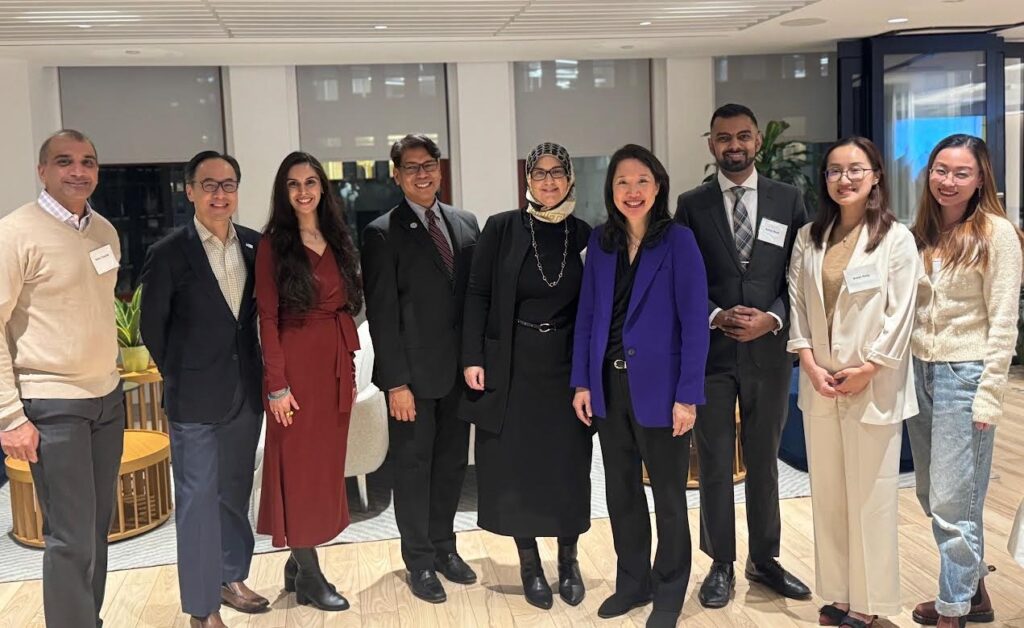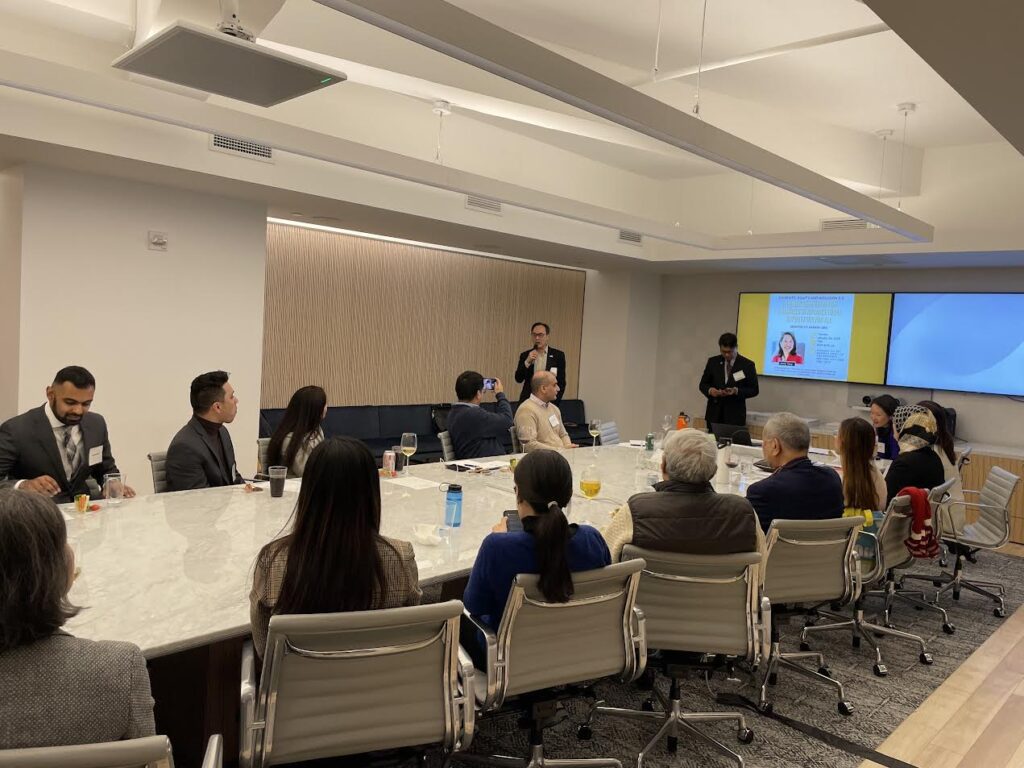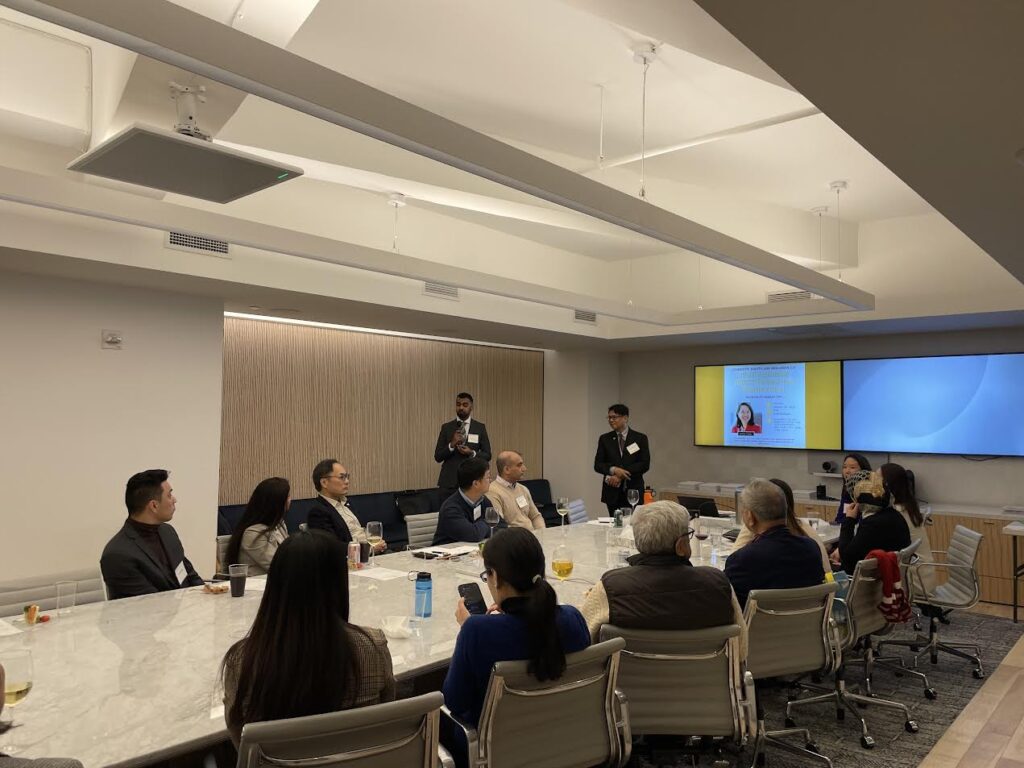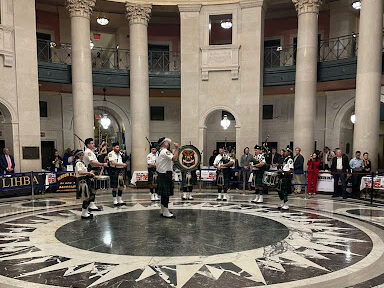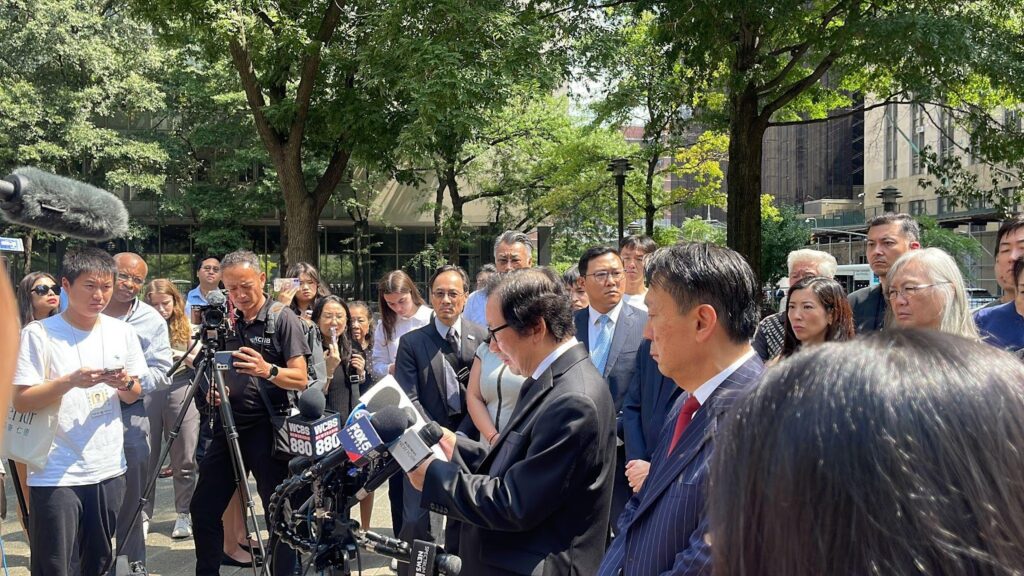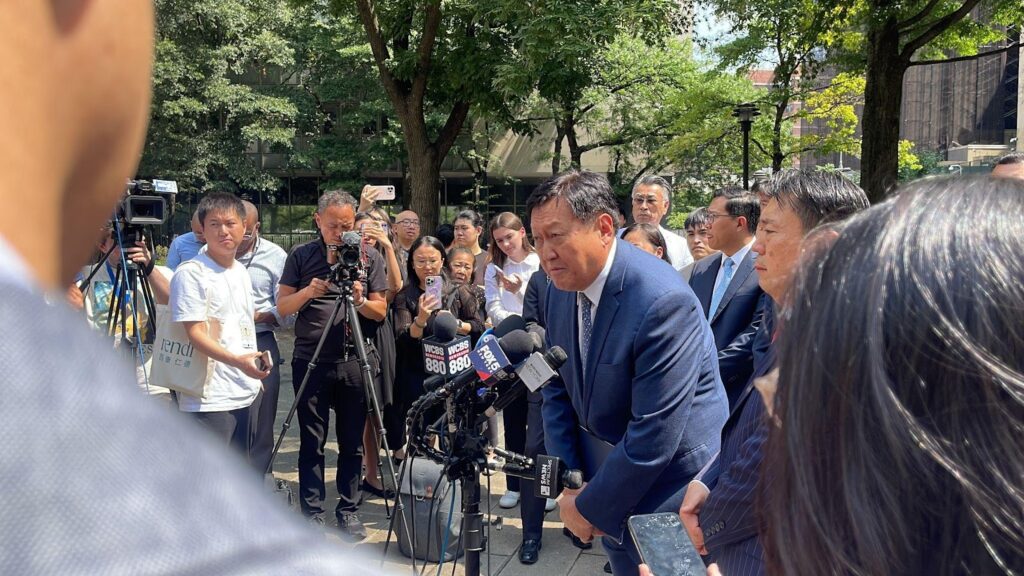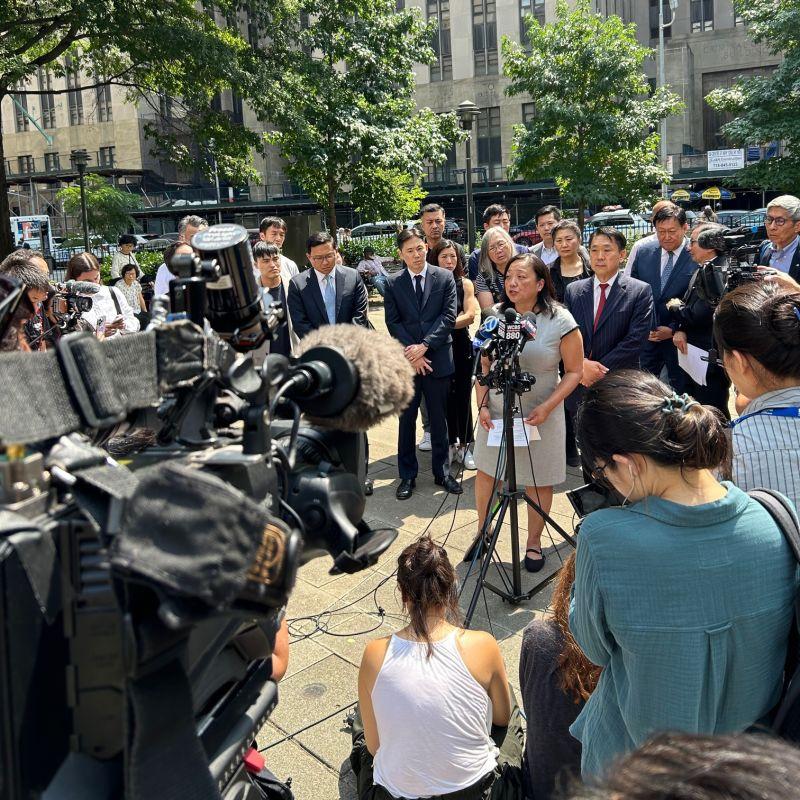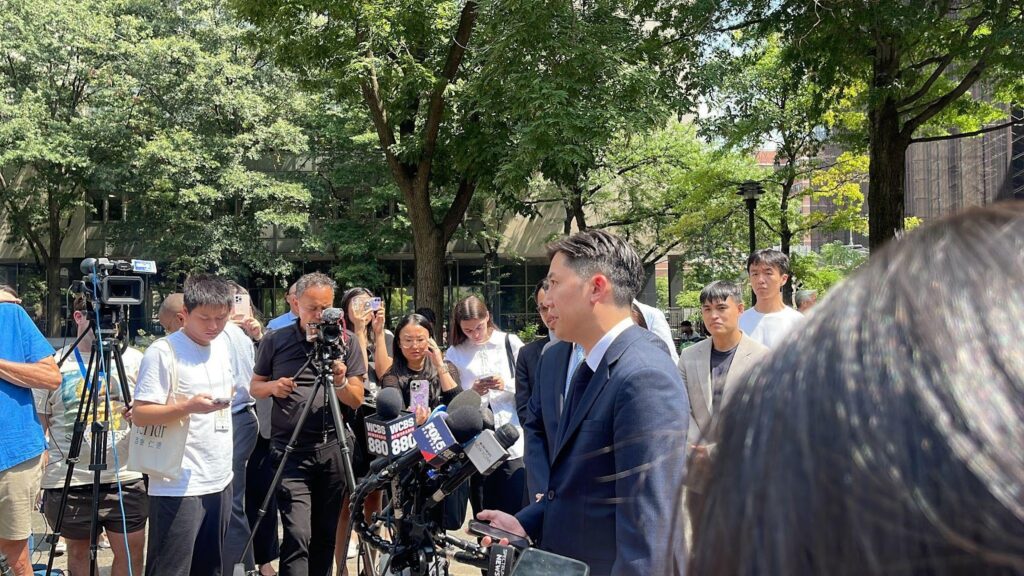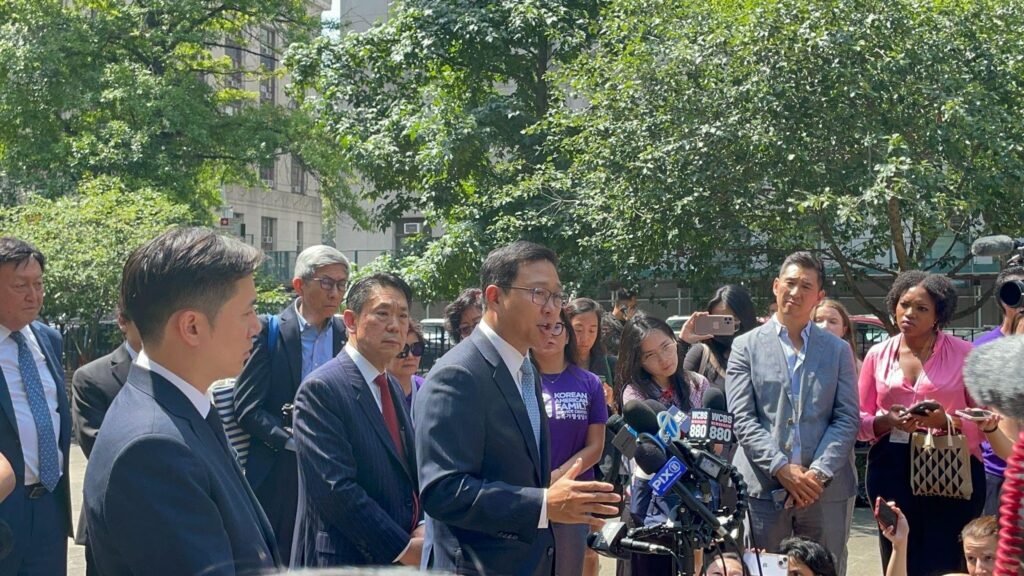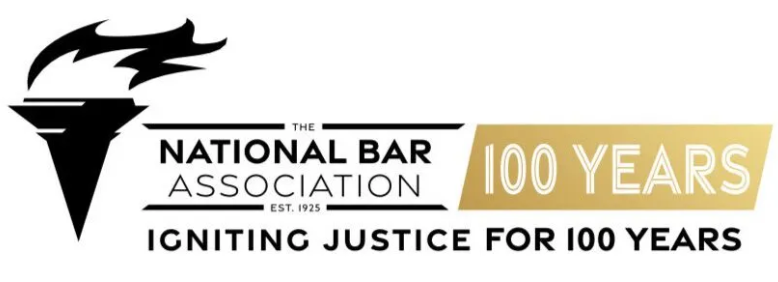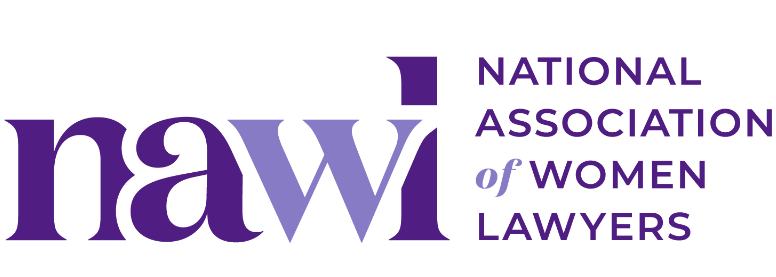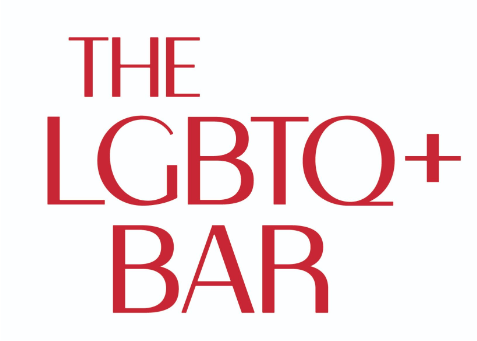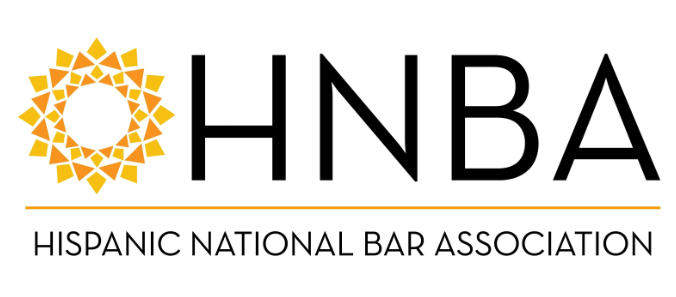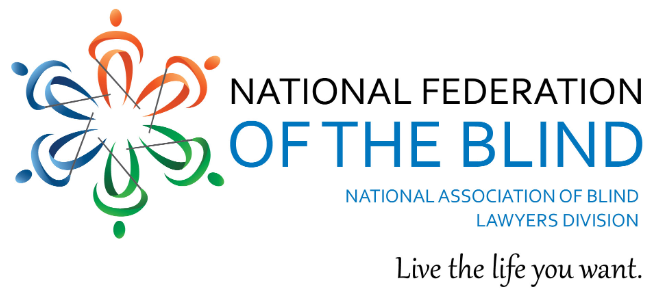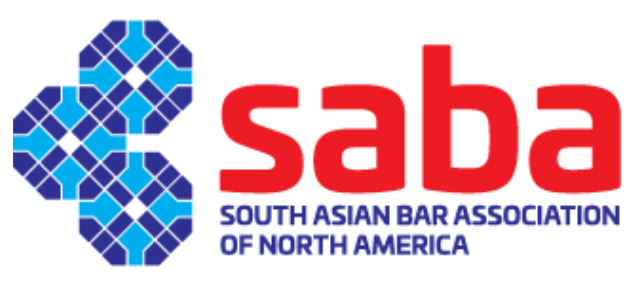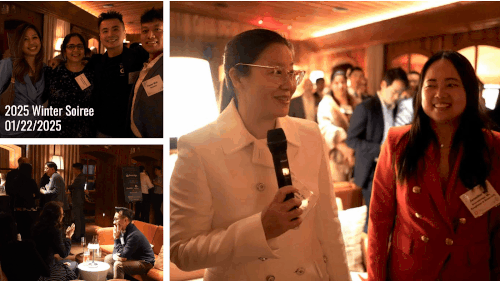
As 2025 draws to a close, AABANY reflects on a successful year centered around the theme, “Together We Thrive: The Power of Us!” We deeply appreciate the involvement and commitment of our members.
Below are some key highlights from the year. Our sincere thanks also go to all our generous sponsors, whose support remains vital to AABANY’s mission of promoting and enhancing equity and inclusion in the legal profession. We are grateful for the continuous collaboration with our community partners in the ongoing effort to uplift and advocate for the Asian American and Pacific Islander (AAPI) community across New York.
Winter Soiree

In its 15th year, the AABANY Winter Soiree continued to be one of the year’s premier networking opportunities, specifically designed for executive and senior in-house and law firm attorneys. Hosted by the In-House Counsel Committee and the Corporate Law Committee, the invite-only event has evolved from its previous incarnations as the Summer Soiree and the Wine Tasting and Networking Reception. The 2025 iteration took place on Thursday, January 23, at Le Chalet. Located within the iconic Saks Fifth Avenue, the cozy, ski-lodge-inspired lounge offered an elegant and intimate setting, fostering an evening of meaningful connections and professional camaraderie.
Annual Meeting of Members
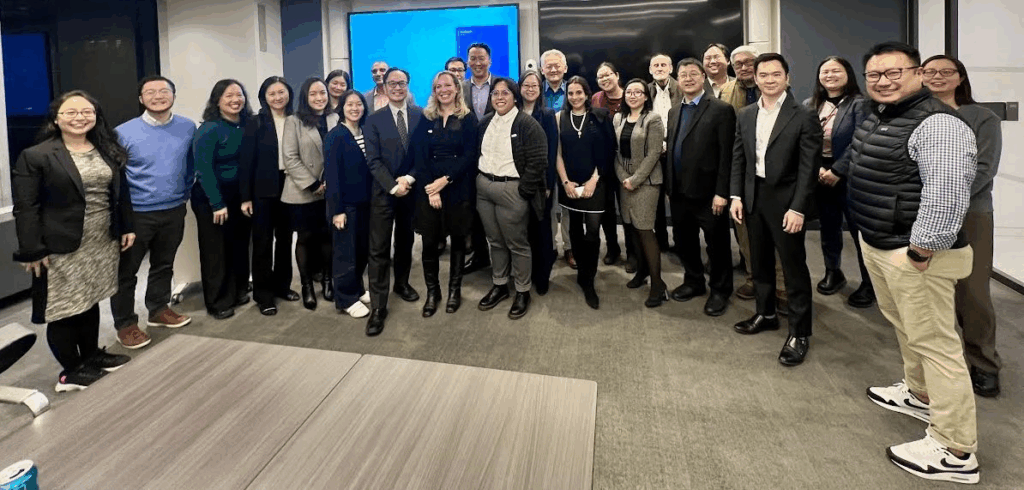
AABANY’s Annual Meeting of Members was held at King & Spalding on Tuesday, February 11, 2025. The primary focus of the meeting was the election of the new Board of Directors and Officers for the FY2026 term, which officially commenced on April 1, 2025.
During the event, then-President Joseph Eng delivered the Annual Report of the Board, providing a summary of the past fiscal year’s major achievements. Executive Director Yang Chen presented the Annual Report of the Committees. The following awards were presented to recognize exceptional dedication to AABANY during FY2025:
- Committee of the Year: Professional Development Committee
- Program of the Year: Pre-Holiday Multi-Association Gathering
- Member of the Year: Gary Yeung
Congratulations are extended to all the award recipients and to the newly elected Officers and Directors.
The evening concluded on a poignant note with a farewell to Deputy Executive Director Alice Biagini, whose last day was February 11th. In her eight months with AABANY, Alice significantly enhanced our operations and activities, providing invaluable support to our Board members, Committee Chairs, and the general membership. She will be greatly missed by all those she worked with.
Annual Judges’ Reception

AABANY’s Judiciary Committee hosted its Annual Judges’ Reception on Tuesday, April 8, 2025, at Fordham Law School. The event, which drew about 70 attendees, was a yearly opportunity to honor newly elected, appointed, elevated, and retired Asian American and Pacific Islander (AAPI) judges throughout New York. It was an evening characterized by reflection, gratitude, and a forward-looking hope for greater AAPI representation within the judiciary.
Chinatown Manpower Project (CMP) 2025 Law & Justice Gala Honoree

AABANY was an honoree at the Chinatown Manpower Project (CMP)’s Law & Justice Gala on April 24, 2025. The event, which drew over 400 guests, was a lively evening of celebration, networking, and philanthropy. AABANY was recognized for our essential work in advocating for rights, advancing the interests of immigrants, amplifying Asian American voices, and ensuring justice for all.
Other distinguished honorees included the Asian American Law Fund of New York (AALFNY), AABANY’s 501(c)(3) affiliate; Edward J. Cuccia, Esq.; and the Honorable Karen Lin, AABANY member. The Spirit of Immigrants Award was jointly presented to Nikki Kwok and Hailey Kwok.
AAPI Heritage Month
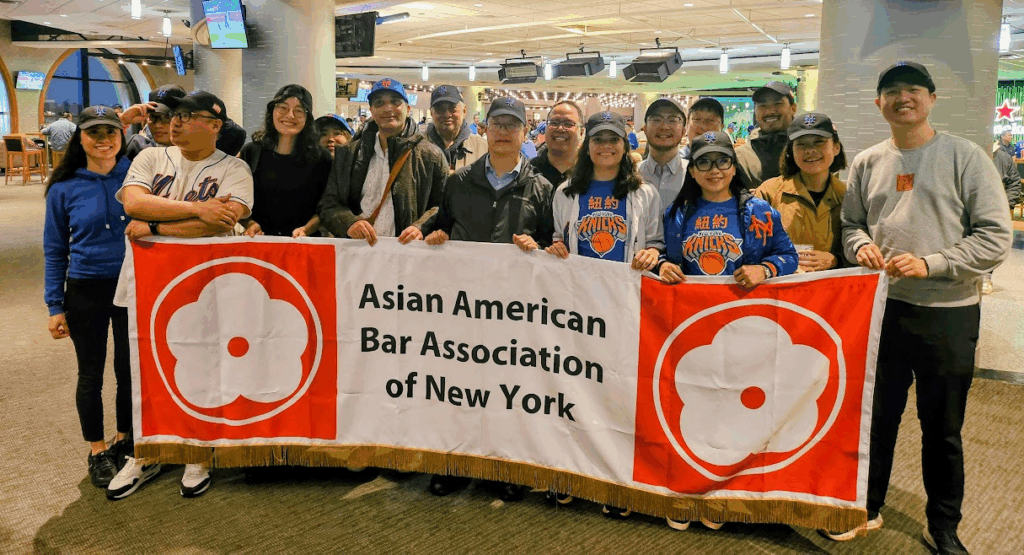
2025’s AAPI Heritage Month was again filled with nonstop events that were organized or co-sponsored by AABANY and its various Committees. It kicked off with a Karaoke Showdown on May 1, 2025 that was co-sponsored with KALAGNY and FALA New York. Then AABANY sponsored a “Sunday Run Day” series where members met up at 8:30am on Sundays near the 86th Street A station to run and prepare for the May 24th AAPI 5k run at Hudson River Greenway. AABANY also co-sponsored the South Brooklyn AAPI Heritage Month Celebration on May 10th. On May 14th, AABANY co-sponsored the Third Annual Hon. Randall T. Eng Award Program at the Appellate Division, Second Department, in Brooklyn. Before a room full of distinguished judges, elected officials, and community leaders, we celebrated three trailblazing public servants whose work embodies integrity, leadership, and a deep commitment to justice: Senator Stephen Chan, Justice Anar R. Patel, and Lieutenant Mido Mary Wu.

On the night of May 14, AABANY members and supporters gathered at CitiField / Mets Stadium in Flushing for the Mets v. Pirates Baseball Game in celebration of AAPI Heritage Month (top photo in this section). The same night, AABANY co-sponsored a “Talking with Trailblazers” event at Skadden, Arps, Slate, Meagher & Flom, which featured the Honorable Denny Chin and Kathy Hirata Chin. Later in the month, on May 18, AABANY co-sponsored an event called “Asian Americans in Public Service” with various public service professionals in celebration of AANHPI Heritage Month. AABANY’s Government Service and Public Interest Committee together with AABANY’s Judiciary Committee also co-sponsored “A Legacy of Leadership & Resilience: Then and Now, In the Context of Korematsu and Thind” at the Queens Supreme Court on May 20, 2025.
The month wouldn’t be complete, of course, without AABANY’s Pro Bono Clinics, which were held on May 21 in Manhattan and on May 31 in Brooklyn. A screening of the documentary “Voices Against Anti-Asian Hate” followed by a discussion with two esteemed panelists (Judge Marilyn D. Go and Rachel Lee) on hate crimes happened on May 28, 2025 in partnership with Richmond County District Attorney’s Office.
The month also included the Community Memorial Service for Justice Dorothy Chin-Brandt on May 24, 2025 at the Glow Cultural Center in Flushing, an event that commemorated her profound contributions to the judicial system and the Asian American community.
AAPI Heritage Month concluded with AABANY members and friends marching in the Fourth Annual AAPI Cultural and Heritage Parade in Midtown Manhattan on June 1, 2025. As we did in prior years, AABANY wore matching red and blue t-shirts and were joined by AABANY Immediate Past President Joseph Eng Jr. and his son Max who brought a Chinese lion head and drum to perform a traditional Chinese Lion Dance along the parade route up Sixth Avenue.

36th Anniversary Annual Dinner
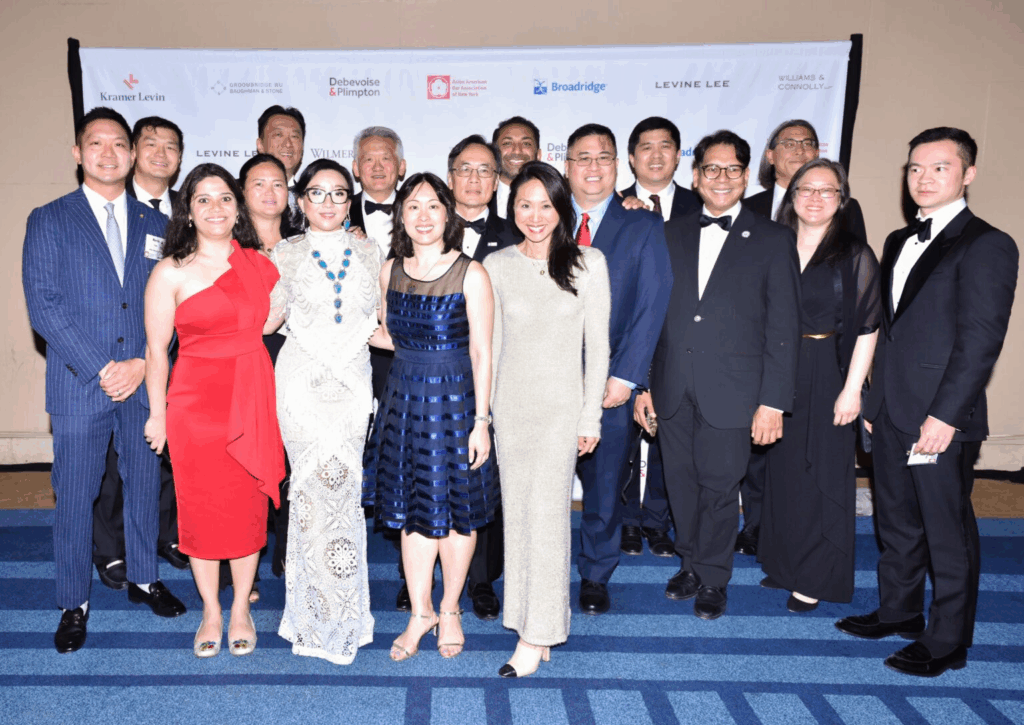
On May 29, 2025, the Asian American Bar Association of New York (AABANY) hosted its 36th Anniversary Annual Dinner at the elegant Cipriani Wall Street, under the theme: “Together We Thrive: The Power of Us!” Held once again during AAPI Heritage Month, the event welcomed approximately 750 guests, including attorneys, judges, prosecutors, in-house counsel, government officials, and community leaders. AABANY also hosted nearly 50 General Counsels in the GC Reception held before the dinner, thanks to the General Counsel Reception Sponsor Groombridge, Wu, Baughman & Stone.
The honorees for AABANY’s Annual Dinner included:
- Women’s Leadership Award: Professor Elaine Chiu, St. John’s University School of Law
- Corporate Leadership Award: Henry Hadad, Senior Vice President, Deputy Counsel, Bristol Myers Squibb
- Law Firm Leadership Award: Quinn Emanuel Urquhart & Sullivan, LLP
AABANY also congratulated Don H. Liu Scholars Program’s 2025 Scholars:
– Cindy Guo, Harvard Law School
– Teja Kim, UCLA School of Law
– Mikka Vapor, University of Pennsylvania Law School
Thanks to everyone who attended and helped to make our Annual Dinner a success! To read AABANY’s blog post of the event, including the photo albums linked on the bottom of the blog post, please click here.
Summer Receptions

The warmer weather of Summer 2025 provided the perfect backdrop for AABANY to host a variety of successful receptions and mixers. One highlight was the Summer Associates Mixer on July 22, co-hosted with the Korean American Lawyers Association of Greater New York (KALAGNY) at Tap Haus 33. This event provided a relaxed atmosphere for fostered networking, conversation, and community building by connecting summer associates and law students with practicing attorneys.
Another well-attended gathering was the Summer Reception held on July 17 with the Asian American Law Fund of New York (AALFNY). This annual reception served to recognize the AALFNY Public Interest Scholarship recipients and featured a distinguished guest speaker: Judge Denny Chin, Co-Director of the Center on Asian American and the Law at Fordham Law School.
Wellness Events
AABANY maintained a strong focus on attorney wellness throughout 2025 with several key events.
The year kicked off on March 22, 2025, with the 2nd Annual Mindfulness Wellness Retreat held exclusively for AABANY members at Blue Cliff Monastery in upstate New York. This retreat offered a much-needed sanctuary for participants to relax, reflect, and connect, prioritizing their mental and emotional well-being.

Mid-year, AABANY successfully hosted its Third Annual Wellness Day on June 21, 2025, at Brooklyn Law School. Made possible by the dedicated support of AABANY’s speakers and sponsors, the event upheld the wellness initiatives championed by former AABANY President Karen Kim. Attendees engaged with crucial topics impacting physical and mental health, including strategies for managing daily stressors, the impact of unhealthy drinking culture in the legal profession, recognizing signs of depression, and identifying support groups and resources.

We are thrilled that AABANY received the Bar Leaders Innovation Award from the New York State Bar Association for our Annual Wellness Day program. The award was presented on October 29, during the Bar Leaders Fall Meeting Reception held at the New York City Bar Association. What started as a thoughtful initiative has grown into a beloved annual event that brings our community together to focus on mental, physical, and emotional well-being. It’s become a highlight of the year for many of our members.

Finally, on Tuesday, November 11, 2025, the 3rd Annual Pre-Holiday Multi-Association Gathering brought together AABANY and 20 other associations at the New York City Bar Association. The evening featured a potluck dinner and a CLE Program on Wellness Resources. Because the event fell on Veterans Day, the CLE program included a Fireside Chat focusing on veterans in the legal profession, moderated by President Ben Hsing.

Fall Conference

AABANY successfully hosted its 16th Annual Fall Conference, “Together We Thrive: The Power of Us!,” on Saturday, September 27, 2025, at New York Law School. The day commenced with a buffet breakfast, allowing attendees to network over coffee, pastries, bagels, and light bites.
Program Highlights:
- Morning and Afternoon CLEs: Twelve different panel presentations throughout the day focusing on a wide range of topics, from disability rights, to intellectual property, to community empowerment.
- Plenary Lunch Session and Trial Reenactment: This session featured a reenactment of the landmark U.S. Supreme Court cases Ozawa v. United States (1922) and United States v. Bhagat Singh Thind (1923). The dramatization explored these two pivotal early 20th-century decisions that denied naturalization to Asian immigrants: Takao Ozawa, who argued his light skin and assimilation qualified him as “white,” and Bhagat Singh Thind, an Indian Sikh man who claimed Caucasian status based on Aryan ancestry to meet the “free white person” requirement for citizenship.
- Diversity Career Fair (DCF): Hosted by the Career Advancement Committee, the DCF ran from 10:30 AM to 4:30 PM. Recruiters and legal professionals from public, corporate, nonprofit, and legal services sectors hosted informational tables, with some conducting first-round on-site interviews. Attendees were able to network, exchange resumes, and meet with potential employers.
- Trial Advocacy Program (TAP): Returning this year, TAP offered junior attorneys structured, mentored training in essential trial advocacy skills. The program included lectures, demonstrations, and hands-on exercises focused on opening and closing statements, as well as direct and cross-examinations. Participants prepared based on a mock trial problem and presented opening statements as well as conducted direct and cross-examinations before a faculty of experienced trial lawyers in breakout rooms, receiving individual feedback and coaching.
- Link-Up Reception: A key networking event of the day, the Link-Up Reception was designed to facilitate engagement between law firm attorneys and senior in-house counsel seeking external legal services. This exclusive benefit was open only to invited in-house counsel, Gold-level sponsors and above, and representatives from the 2025 Annual Dinner and Winter Soiree sponsors, providing higher-tier sponsors with increased exposure and direct access to in-house decision-makers.
Closing and Award Presentation:
A highlight that closed the conference was the presentation of the Norman Lau Kee Trailblazer Award during the general Cocktail Reception. The award, which recognizes leadership, innovation, mentorship, and sustained community impact, was presented to Hon. Judy H. Kim, Acting Justice of the Supreme Court, New York County.
In her acceptance speech, Justice Kim emphasized the profound importance of mentorship and community. She shared a moving anecdote from an intern who wrote to her, “You have shown me into a world that I thought I would never be able to be part of, and the gift that you have given me is priceless.” This reflection left a deep impression on all attendees, reinforcing the value of guidance and support in the legal profession.
To read more about the Fall Conference, click here.
First-ever Diwali Dinner
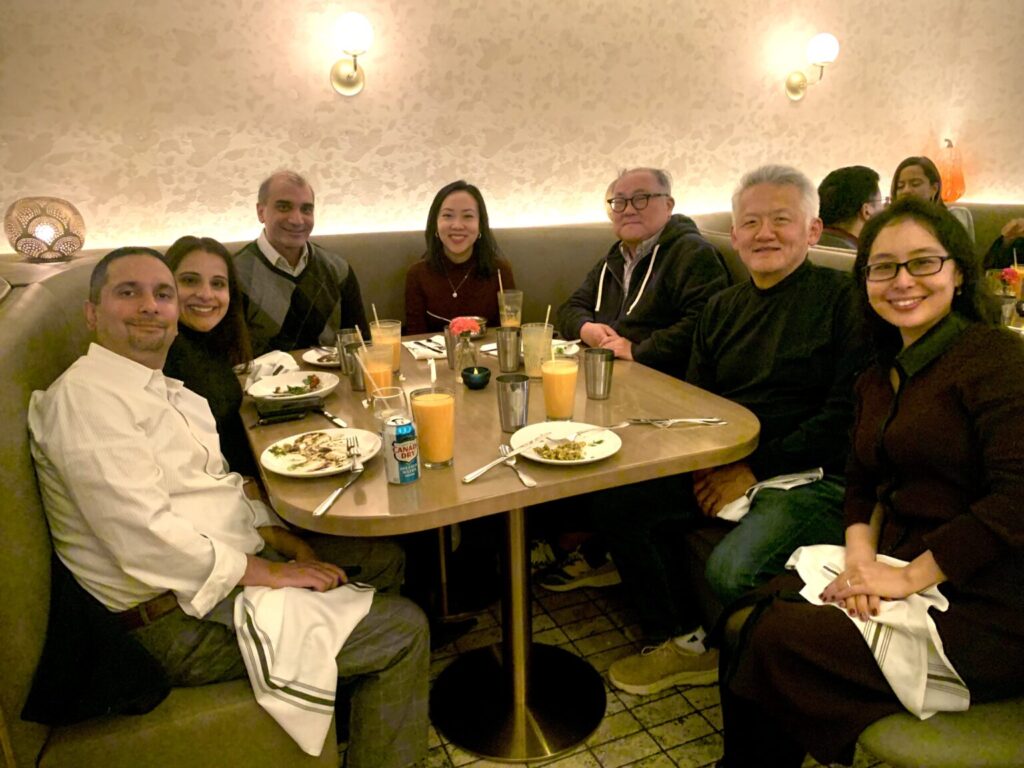
On October 28, 2025, AABANY held its first-ever Diwali Celebration at Bengal Tiger on 56th St in Manhattan. Co-sponsored by the South Asian and Indo-Caribbean Bar Association of Queens (SAICBA-Q), the sold-out event brought together dozens of members of both AABANY and SAICBA-Q to celebrate the Festival of Lights — a holiday oftentimes celebrated by Hindus, Jains, and Sikhs that symbolizes the triumph of light over darkness, good over evil, and knowledge over ignorance. People celebrate by lighting oil lamps, decorating their homes, setting off fireworks, and exchanging gifts and sweets. The event was well attended by members of all backgrounds ranging from students to associates to partners to judges to non-lawyer allies. It was great to see many attendees wear festive attire for the occasion. Attendees were able to order from a variety of appetizers, chaats, entrees, and desserts, and enjoyed mango lassis as well. We look forward to making this an annual event going forward with increased capacity to accommodate members’ interest in attending. AABANY and SAICBA-Q also look forward to co-hosting other events in the future, including a potential Holi celebration in the spring of 2026.
Pro Bono Clinics



We thank the Pro Bono and Community Service (PBCS) Committee for another year of Pro Bono Clinics and their continued efforts to aid the AAPI community in Manhattan, Queens, and Brooklyn. The PBCS Committee held monthly clinics in Manhattan with our community partner AAFE (Asian Americans for Equality) at their Norfolk Street site on the Lower East Side. Together with AAFE, the Committee held bi-monthly clinics in downtown Flushing at AAFE’s offices there. The Committee held bi-monthly clinics in Brooklyn with our community partners, including the Chinese-American Planning Council (CPC). To read the blog posts summarizing each Clinic, please see this link. Our Pro Bono Clinics need you! Please consider volunteering. Click on the flyer for more information.
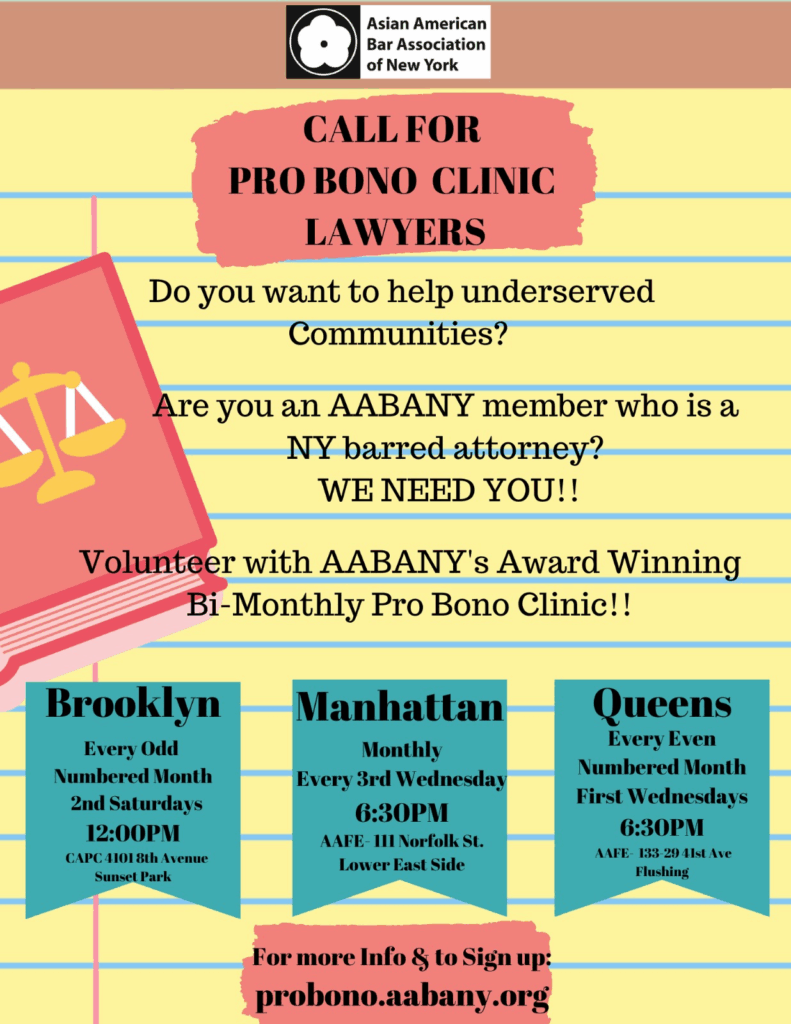
Events and Programs from Our Committees
We would also like to thank AABANY’s Committees for organizing and hosting various events and programs throughout this fiscal year. To learn more about AABANY’s 27 Committees go here. To date, after three quarters so far of this fiscal year, our Committees have put on some 120 programs, which averages out to 3 or 4 events per week. Below are a few highlights:
Intellectual Property Committee – Board Game Nights

AABANY’s IP Committee held four board game nights in 2025 – on March 7, April 9, July 23 and December 18. Hosted by the law firm of Fish & Richardson in Time Square, the evenings invited attendees to unwind and connect over friendly competition. To read more about board game nights, see here.
Real Estate Committee – “What’s Happening in Queens”

On June 26th, 2025, at JP Morgan Chase Bank in Bayside, AABANY’s Real Estate Committee hosted their “What’s Happening in Queens” networking event, which brought together a variety of people interested in making meaningful connections in the Queens real estate scene.
In 2025, the Real Estate Committee also put on a number of programs, many of which provided New York CLE credits. A sampling of the programs includes:
- Cybersecurity, Artificial Intelligence and Real Estate Fraud (May 21)
- Transfer on Death Deeds Law Under NY Real Property Law (May 28 – co-sponsored with the Trusts & Estates Committee, and June 17)
- Clearance and Closing a Residential Real Estate Transaction (August 19)
- 1031 Exchange Basics and Foreign Real Estate Regulations (November 19)
- The Basics of Title Insurance Underwriting (December 4)
Corporate Law Committee Golf & Game Night at Five Iron Golf

AABANY’s Corporate Law Committee, under the leadership of Vice Chairs Ashley Wong and Kyle Zhu, hosted the exciting Golf & Game Night on Friday, July 11. This high-energy event, generously sponsored by PNC Bank and held at Five Iron Golf in Midtown Manhattan, offered attendees virtual golf, ping pong, drinks, and a chance for community connection. It drew a diverse group of attorneys, in-house counsel, and professionals—spanning fields from international tax law to capital market transactions—for a night that successfully blended fun with a corporate-law focus.
GCs Uncorked

AABANY concluded September with an intimate and engaging wine tasting and live music event called “GCs Uncorked” at Saltwater NYC, the cozy coffee shop and wine bar co-owned by Sumeet Chugani, General Counsel at Cloaked. The special, packed evening on September 30 brought together AABANY members and senior in-house counsel for conversation and connection.
LGBTQ Committee – Fall LGBTQ Reception

AABANY’s LGBTQ Committee and the South Asian Bar Association of New York (SABANY) successfully co-hosted the 2025 Fall LGBTQ Reception on Thursday, November 13, 2025. Held at A&O Shearman’s Manhattan office, the event was a memorable gathering that fostered connections among attorneys, law students, and professionals within the Asian American, South Asian, and LGBTQ communities.
Intellectual Property Committee – Dumplings and Discussion Series

AABANY’s IP Committee continued the ever popular “Dumplings and Discussion” Series with various industry leaders, sharing their journey in the legal profession and offering insights over plates of dumplings. Some of the featured guests include:
- Alan Chang, General Counsel/Senior Vice President, New York Yankees (December 7)
- Michelle Lee, General Counsel, Media Co (November 12)
- Christopher Y. Chan, General Counsel, JLL Technologies (August 26)
- Sonia Low, Vice President, General Counsel, and Corporate Secretary, Jacob K. Javits Convention Center (July 30)
- Liz Nie, General Counsel and Corporate Secretary, Acorns (June 16)
- Stephen Mar, Chief Legal and Administrative Officer, Odeko (April 23)
- Osamu Watanabe, General Counsel, Moelis (March 18)
The above sampling of events represents just a fraction of the numerous programs put on by AABANY’s Committees over the first three quarters of this fiscal year. In addition, AABANY co-hosted with other bar associations and community groups more than 30 programs. It has been a busy 2025!
AABANY at the NAPABA Convention in Denver

AABANY showed up in force at the 37th National Asian Pacific American Bar Association (NAPABA) Convention. Held at the Sheraton in downtown Denver, CO, from November 6 to 8, 2025, this year’s Convention was notable for being the second-largest convening in NAPABA history.
The event attracted nearly 2,900 attendees, including AANHPI attorneys, judges, law professionals, and law students, with more than 800 people attending for the first time.
For further details on AABANY’s involvement and the many AABANY Awardees recognized at the NAPABA Convention, please check out this blog post.
Annual Holiday Party

AABANY celebrated the end of the year with our Annual Holiday Party on Friday, December 5, 2025, held at Upon The Palace, a premier Asian Fusion restaurant located in Tribeca, New York. The event presented a wonderful opportunity for everyone to connect and enjoy the holiday season.
The intimate atmosphere of the restaurant’s downstairs party room was a popular choice among AABANY members, providing a private setting for mingling and enjoyment. Having previously hosted attendees after the Fall Conference in September, this location might end up becoming a favorite venue for future AABANY gatherings.
Speaking Up, Speaking Out
Throughout 2025, AABANY actively upheld our mission to foster the meaningful participation of Asian American Pacific Islanders (AAPI) in the legal field, issuing important statements and celebrating significant community accolades.
AABANY proudly highlighted the achievements of AAPI judges and lawyers, including:
- January 9, 2025: AABANY congratulated Hon. Jeffrey K. Oing (Ret.) on joining JAMS, the world’s largest private provider of alternative dispute resolution (ADR) services.
- June 18, 2025: AABANY applauded the appointment of Jay Y. Kim to the New York State Court of Claims by Governor Kathy Hochul, which was announced on June 10, 2025.
- July 9, 2025: AABANY congratulated Pei Pei Cheng de Castro on her appointment by Governor Kathy Hochul, announced on June 27, 2025, to serve as Chair and Trustee of the New York State Interest on Lawyer Account (IOLA) Fund.
- July 10, 2025: Following the June 2025 primary elections, AABANY congratulated Sheridan Chu and Eve Cho Guillergan on securing the Democratic nominations for Judge of the New York City Civil Court in Queens County.
- July 25, 2025: AABANY celebrated the historic designation of AABANY member, the Honorable Margaret Chan, by Governor Kathy Hochul to the Appellate Division, First Department of the New York State Supreme Court.
- September 8, 2025: AABANY proudly congratulated four exceptional AAPI judges—Honorable Judy Kim, Honorable Kris Singh, Honorable Soma Syed, and Honorable Frances Wang—on their nominations to the New York State Supreme Court.
- October 29, 2025: AABANY was proud to celebrate longstanding member Alice Young, who received the Lifetime Achievement Award from Womankind at their 2025 Communities Rising Gala.
AABANY advocated for our community’s interests throughout 2025 by taking key positions on important initiatives:
- May 2, 2025: AABANY joined 23 other bar associations in filing an amicus brief in Susman Godfrey LLP v. Executive Office of the President, Civil Action No. 1:25-cv-01107-LLA, in the United States District Court for the District of Columbia.
- September 24, 2025: AABANY expressed deep concern over the Presidential Proclamation issued on September 19, 2025, which imposed a $100,000 fee on the entry of H-1B workers, effective for petitions filed on or after September 21, 2025. We voiced our view that this measure would disproportionately harm the Asian American, Native Hawaiian and Pacific Islander (AANHPI) community, negatively impact the New York and national economies, and raise serious legal and policy issues.
Finally, on November 13, 2025: AABANY recognized the historic election of Zohran Mamdani as Mayor of New York City, noting that he is the first New York City Mayor of Asian American and South Asian ancestry.To read all the press releases from AABANY in 2025, click here.
Upcoming events
Our current fiscal year runs through March 31, 2026, and our Committees will be putting on many great events over the coming months that we hope you will join.
For example:
- January 9: Trusts & Estates Committee Monthly Meeting. Click here for more information and to register by January 7th.
- January 10: AABANY Bi-Monthly Brooklyn Pro Bono Legal Clinic. Click here for more information and to register by January 8th.
- January 15: Join AABANY’s Anti-Asian Violence Task Force for a Prayer Walk for Michelle Go. Click here for more information and to register by January 13th.
- January 15: AABANY Issues Committee Monthly Meeting. Click here for more information and to register by January 13th.
- January 20: AABANY Board Meeting. Click here for more information and to register by January 15.
- January 21: AABANY Monthly Manhattan Pro Bono Legal Clinic. Click here for more information and to register by January 19th.
- January 21: AABANY Presents: Solo & Small Law Firm Litigators – Strategies for Success and Why Clients Should Care. Click here for more information and to register by January 19th.
- January 22: AABANY Presents: Pathways to Court-Connected ADR. Click here for more information and to register by January 15th.
- February 4: AABANY Bi-Monthly Queens Pro Bono Legal Clinic. Click here for more information and to register by February 2nd.
- February 11: Save the Date – Annual Meeting of Members. Stay tuned for details.
Save The Dates
Our next marquee event is the Winter Soiree, on Jan. 22. This invitation only event is open to executive and senior-level in-house counsel and corporate law firm sponsors. For more information or for sponsorship information, contact [email protected]. The deadline to sponsor is January 9.

Be sure to save the date for the 2026 Annual Dinner on May 28,2026 at Cipriani Wall Street. We will be celebrating remarkable individuals and achievements in the legal profession and community in New York.

Save the Date also for AABANY’s Fall Conference, which will take place at Fordham Law School on September 26, 2026. Please make plans to join us!
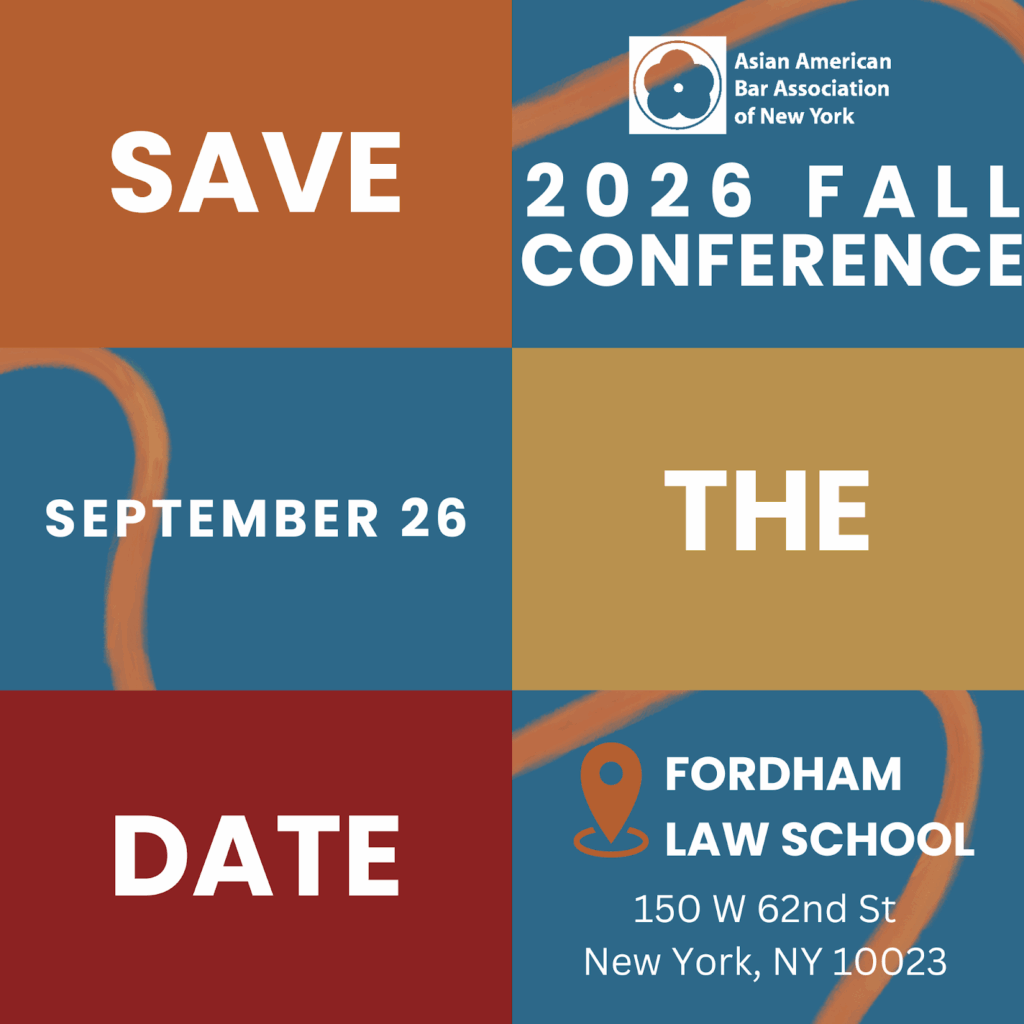
Thank you!
We would not have had such an active year if it were not for the support from everyone involved in AABANY. We thank our Board Officers and Directors, as well as our Committee Co-Chairs and Vice Chairs, and we are grateful for the dedication of our staff, and the hard work of our volunteers and interns.
We also extend our appreciation to the members of AABANY– without you we would not be what we are today. As we close out 2025, our membership now exceeds 1400 paid members. We look forward to your continued support and participation in the coming year.








